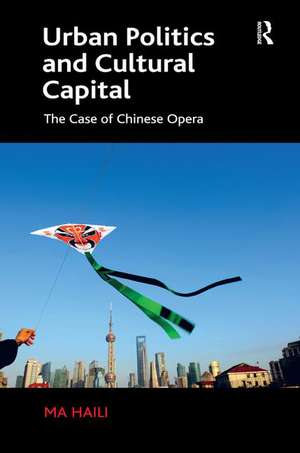Urban Politics and Cultural Capital: The Case of Chinese Opera
Autor Ma Hailien Limba Engleză Hardback – 28 ian 2015
| Toate formatele și edițiile | Preț | Express |
|---|---|---|
| Paperback (1) | 255.84 lei 6-8 săpt. | |
| Taylor & Francis – 30 iun 2020 | 255.84 lei 6-8 săpt. | |
| Hardback (1) | 1001.07 lei 6-8 săpt. | |
| Taylor & Francis – 28 ian 2015 | 1001.07 lei 6-8 săpt. |
Preț: 1001.07 lei
Preț vechi: 1220.81 lei
-18% Nou
Puncte Express: 1502
Preț estimativ în valută:
191.58€ • 208.03$ • 160.92£
191.58€ • 208.03$ • 160.92£
Carte tipărită la comandă
Livrare economică 22 aprilie-06 mai
Preluare comenzi: 021 569.72.76
Specificații
ISBN-13: 9781472432285
ISBN-10: 1472432282
Pagini: 180
Ilustrații: Includes 1 b&w illustration
Dimensiuni: 156 x 234 x 14 mm
Greutate: 0.48 kg
Ediția:New ed
Editura: Taylor & Francis
Colecția Routledge
Locul publicării:Oxford, United Kingdom
ISBN-10: 1472432282
Pagini: 180
Ilustrații: Includes 1 b&w illustration
Dimensiuni: 156 x 234 x 14 mm
Greutate: 0.48 kg
Ediția:New ed
Editura: Taylor & Francis
Colecția Routledge
Locul publicării:Oxford, United Kingdom
Cuprins
Urban Politics and Cultural Capital
Notă biografică
Ma Haili was a member of the Shanghai Luwan Yue Opera Company and is now Senior Lecturer in Chinese Studies at the University of Chester, UK.
Recenzii
’Ma Haili brings meticulous research and her own professional experience to this study of Shanghai Yue opera production in its relation to tradition, urbanization, gender issues, business, marketing, and the changing ideology of the Chinese Communist Party. In doing so, she makes a major contribution not only to Chinese studies, but to cultural studies in general.’ Derek B. Scott, University of Leeds, UK ’The relentless focus on contemporary media and culture in China studies has seriously overlooked the way older forms of culture are being re-invented for the present. This book makes a bold attempt to rectify this. Firmly locating Shanghai's Yueju opera in the dynamic metropolis of the New York of the East, this book takes us on an exhilarating journey through the Communist revolution, the cultural revolution and the great opening up of the late 1970s 'til the new millenium.’ Justin O’Connor, Monash University, Australia ’This book eloquently argues that understanding the vicissitude of Shanghai Yueju opera is also grasping the CCP's struggle to survive in post-Mao China and to stay in power until today. Framing its critique in Bordieu's "capital forms" and their re-distribution in the era of marketization, this book's scholarly contribution crosses over the fields of cultural studies, social studies, Chinese studies, and performance studies.’ Siu Leung Li, Lingnan University, Hong Kong
Descriere
This is the first book to take an interdisciplinary approach to the story of the Shanghai Yue Opera, bringing history, arts management, central and regional government policy, urbanisation, gender, media, and theatre artistic development in one. Through the story of the Shanghai Yue Opera House market reform this book facilitates an understanding of the complex Chinese political economic situation in post-socialist China. This book suggests that as state art institutions are key organs of the Communist party gaining legitimacy, the vigorous evolution and struggle of the Shanghai Yue Opera house in fact directly mirrors the Communist Party internal turmoil in the new millennium to gain its own legitimacy and survival.
